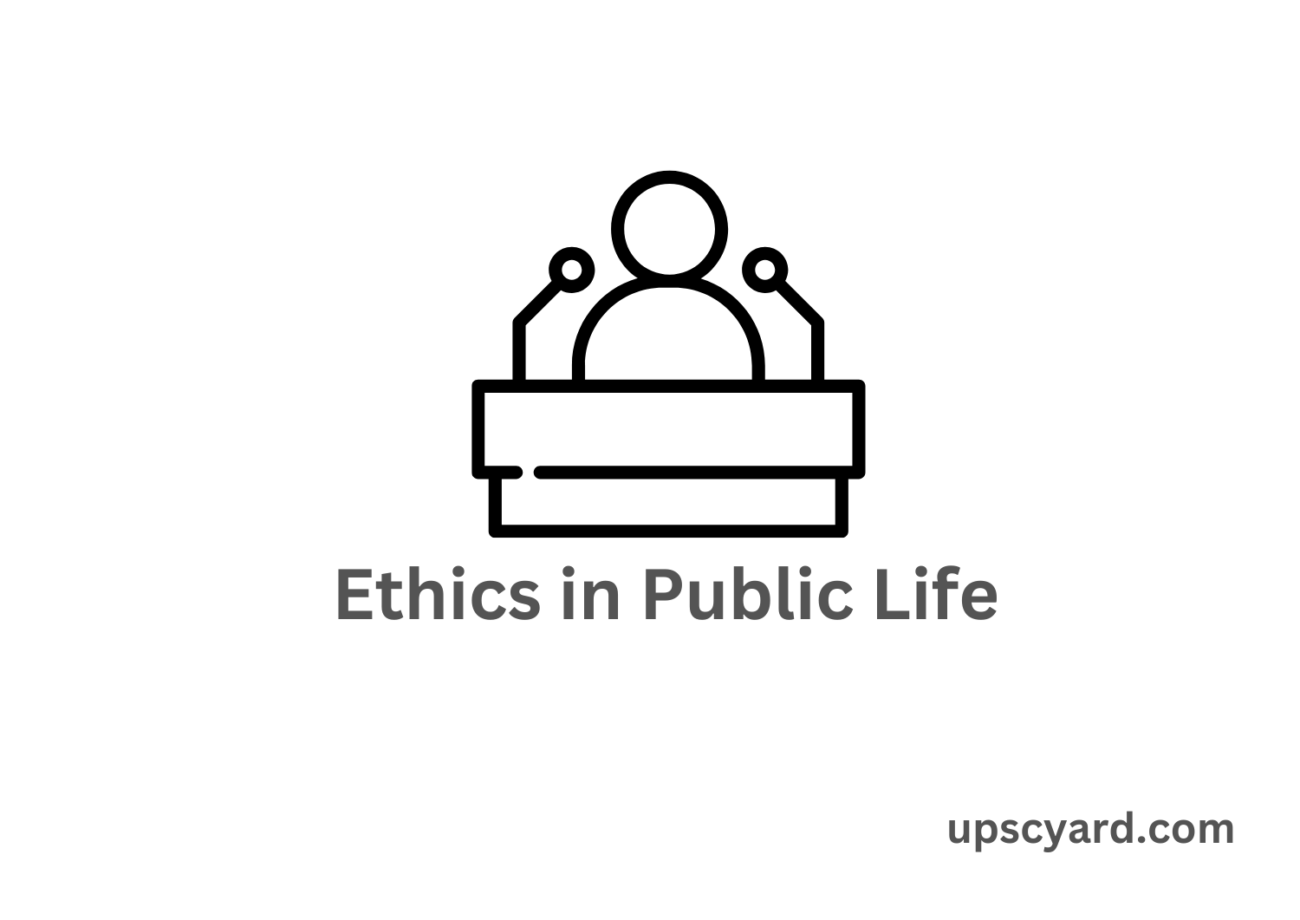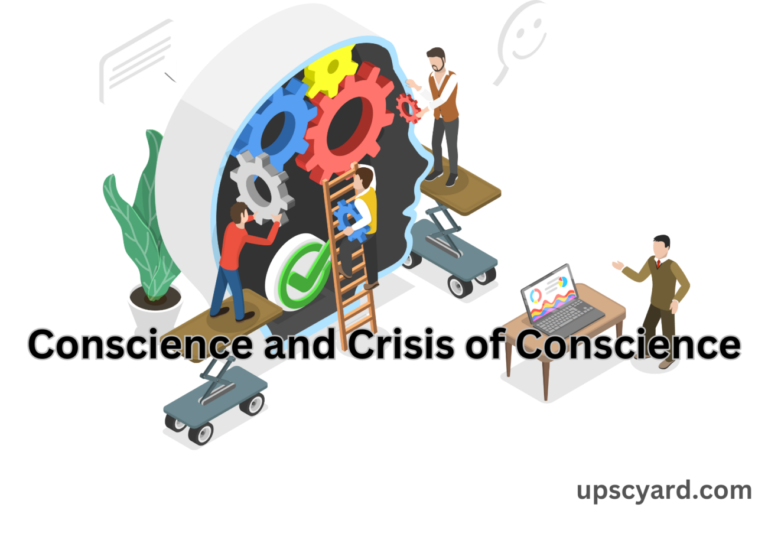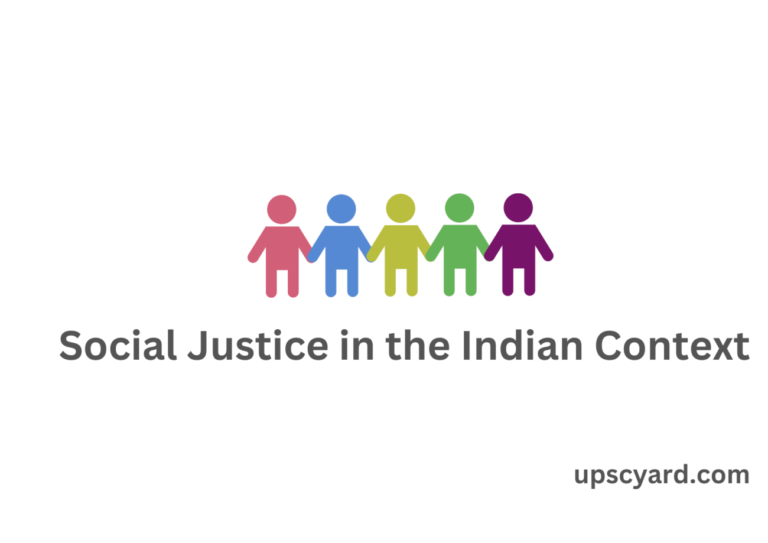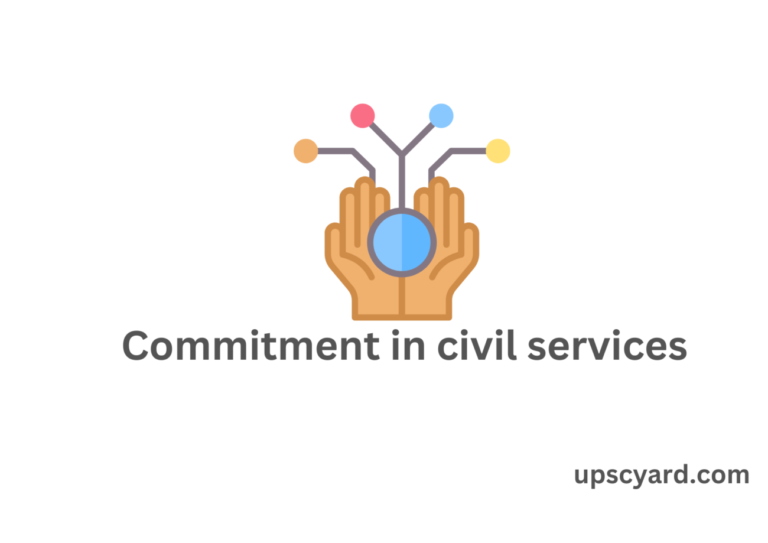Ethics in Public Life
Ethics in governance is rooted in the concepts of responsibility and accountability. In a democracy, all public office holders are ultimately accountable to the people, which is enforced through laws and rules enacted by elected representatives. The foundation of these laws and rules is shaped by the moral ideas and values of the people, reflecting what is considered good and just.
In a democracy, public functionaries act as trustees of the people, with their authority derived from the citizens. As government’s role expands, public functionaries wield significant influence over people’s lives, requiring them to exercise their authority in the best interest of the public, known as “public interest.”
Ethics in public life encompasses various dimensions, from expressing high moral values to holding public functionaries legally accountable for their actions. An ethical framework should include elements like codifying ethical norms and practices, disclosing personal interests to prevent conflicts, establishing mechanisms to enforce ethical codes, and defining norms for qualifying and disqualifying public functionaries from office.
Meaning in Indian specific context
Definition: Public life encompasses various political, cultural, social, and economic structures, including workplaces, constituting the foundation of cohesive societies. Individuals occupying leadership positions within organizations, those who wield influence over others, are, to varying degrees, participants in public life.
The roots of Indian ethics have deep philosophical origins. The earliest Indian texts, the Vedas, dating back to around 1500 B.C., are believed to be among the earliest philosophical treatises.
Ethical considerations within governance have been extensively emphasized in Indian scriptures and various writings, including the Ramayana, Mahabharata, Bhagavad Gita, Buddha Charita, Arthashastra, Panchatantra, Manusmriti, Kural, Shukra Niti, Kadambari, Raja Tarangani, and Hitopadesh.
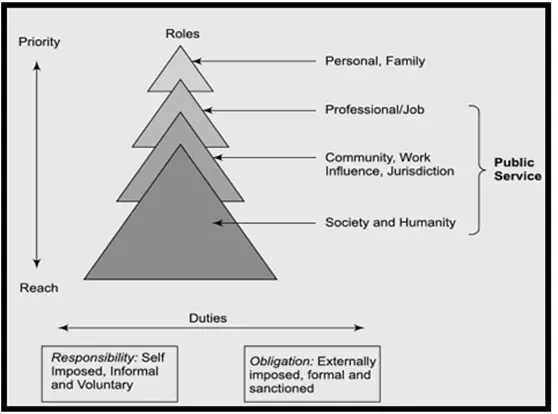
While laws and rules can govern the conduct of lower-level officials with limited discretion, higher-level officials have a greater scope of discretion that may not be fully regulated. Therefore, ethical standards play a crucial role in guiding their actions.
In establishing a framework for ethical conduct, certain essential elements must be incorporated:
- Codification of Ethical Standards: Clearly defining ethical norms and practices.
- Disclosure of Personal Interests: Requiring individuals to reveal personal interests to prevent conflicts between public interests and personal gains.
- Enforcement Mechanism: Creating a mechanism to enforce these ethical codes effectively.
- Qualification and Disqualification Norms: Establishing norms for the eligibility and disqualification of public officials from their positions.
The United Kingdom’s ‘Committee on Standards in Public Life,’ often called the Nolan Committee, outlined seven fundamental principles of public life: Selflessness, Integrity, Objectivity, Accountability, Openness, Honesty, and Leadership.
However, it’s worth noting that the current Conduct Rules encompass many matters, including property transactions, gift acceptance, involvement in non-political organizations, and other activities that individuals typically undertake. These rules, though comprehensive, tend to be overly restrictive, limiting the operational freedom of government employees. They are often expressed in vague terms and can sometimes be impractical.
In practice, these rules are more frequently violated than followed, creating opportunities for the government to harass honest and dedicated officers potentially. Meanwhile, dishonest and corrupt individuals often escape consequences due to the complex procedures involved in initiating disciplinary actions.
International Approach
On October 31, 2003, the General Assembly adopted the United Nations Convention against Corruption through its Resolution 58/4. Article 8 of the Resolution reads as follows:
- To combat corruption, each State Party shall promote integrity, honesty, and responsibility among its public officials, aligning with the fundamental principles of its legal system.
- Each State Party shall strive to implement codes or standards of conduct that ensure correct, honorable, and proper performance of public functions within its institutional and legal frameworks.
- Additionally, each State Party should contemplate establishing measures and systems to facilitate public officials’ reporting of corruption acts to appropriate authorities, following the fundamental principles of its domestic law when such acts come to their attention during their official duties.
The Nolan Committee in the United Kingdom outlined seven principles of public life that can serve as a comprehensive guide for public office holders:
- Selflessness: Decisions should be made solely in the public interest, avoiding personal benefits.
- Integrity: Public officials should not be influenced by external obligations in their official duties.
- Objectivity: Public decisions, appointments, contracts, and recommendations should be based on merit.
- Accountability: Public officials are accountable to the public and must face appropriate scrutiny.
- Openness: Public officials should be transparent about their decisions, providing reasons where needed.
- Honesty: Officials must disclose private interests related to their public duties and resolve conflicts in the public interest.
- Leadership: Public officials should exemplify and promote these principles through leadership.
These principles are applicable in all democracies, and public functionaries should adhere to a code of conduct based on ethical values. Public servants, in particular, should maintain higher standards of behavior than ordinary citizens. A code of ethics outlines guiding principles of good behavior and governance, while a code of conduct specifies acceptable and unacceptable actions in a precise and unambiguous manner. This ensures that those entrusted with leading the nation not only practice ethics but are also perceived to do so.
Creating an ethical framework for ministers
DO’s and Dont’s
The Government of India has established a Code of Conduct that applies to both Union and State Ministers. Before assuming office, a person must disclose details of assets, liabilities, and business interests to the Prime Minister or Chief Minister. They must sever any business connections and divest themselves of interests in businesses that supply goods or services to the government.
Before assuming office as a Minister, an individual must adhere to various requirements, in addition to following the Constitution, the Representation of the People Act, 1951, and other applicable laws. These prerequisites include disclosing detailed information about assets, liabilities, and business interests, both for themselves and their family members, to the Prime Minister or Chief Minister, as applicable. The disclosure should encompass particulars of all immovable property and the approximate value of shares, debentures, cash holdings, and jewelry.
Furthermore, the Minister should sever connections with any business he was involved in before his appointment, though not necessarily divesting ownership. However, in the case of a business supplying goods or services to the government, or relying on licenses, permits, quotas, leases, etc., received from the government, the Minister must divest all interests in the business and relinquish its management.
An exception allows the Minister to transfer management interests to an adult family member or relative, excluding their spouse, who was previously associated with the business. It is worth noting that divesting shares in public limited companies is not generally required, unless the Prime Minister or Chief Minister deems the holding’s nature or extent likely to create conflicts in the discharge of official duties.
A Minister may receive symbolic gifts when going abroad or from foreign dignitaries, but any cash part of such gifts should not be accepted. The Code of Conduct is enforced by the Prime Minister or Chief Minister, and there is a need for a more comprehensive Code of Ethics to guide Ministers in upholding constitutional and ethical standards in their duties.
Ethical Framework of the Code of Conduct for Members of the Rajya Sabha
- Members must uphold the dignity of Parliament and safeguard their credibility by refraining from any actions that could bring disrepute to the institution.
- Members should utilize their position as Parliamentarians to promote the overall well-being and welfare of the people they represent.
- When faced with a conflict between personal interests and the public trust bestowed upon them, Members must prioritize their public duty and find resolutions that place their private interests below the responsibilities of their public office.
- Members should ensure that their financial interests and those of their immediate family do not clash with the public interest. In case of any potential conflicts, they must seek solutions that safeguard the public’s best interests.
- Members must never seek or accept any form of compensation, remuneration, or benefit in exchange for their votes, introducing Bills, moving resolutions, asking or abstaining from questions, or participating in parliamentary deliberations or committees.
- Accepting gifts that might compromise the impartiality and integrity of their official duties should be avoided. However, Members may accept nominal gifts or tokens of appreciation and customary hospitality.
- Members in public offices should utilize public resources in a manner that contributes to the greater public good.
- Confidential information obtained through parliamentary roles should not be disclosed for personal gain or interests.
- Members should refrain from providing certificates to individuals or institutions based on no personal knowledge or unsubstantiated facts.
- Members should refrain from lending unwavering support to causes they have little or no knowledge about. Instead, they should make informed decisions and judgements based on facts and understanding.
Filing Assets and Liabilities Statement
The Representation of the People Act, 1951, was amended by the Representation of the People (Third Amendment) Act, 2002, introducing Section 75A. It mandates elected candidates to declare their assets and liabilities within ninety days of taking office. Rules were formulated for the Members of the Lok Sabha and Rajya Sabha to comply with this requirement.
Office of Profit
Edmund Burke, more than 230 years ago in 1774, addressed his electors in Bristol with these words:
“Your representative owes you not only his industry but his judgment. He betrays you if he sacrifices it to your opinion. Parliament is not a congress of ambassadors with different and opposing interests, but a deliberative assembly representing one nation with one interest – the interest of the whole. Local purposes and prejudices should not guide, but the general good resulting from the reason of the entire nation. When you choose a member, he becomes a member of parliament, not just a representative of Bristol.”
The Constitution of India disqualifies legislators from holding any government office of profit to prevent conflicts of interest and maintain the independence of the legislative office from executive influence.
Code of Ethics for Civil Servants
The Committee on Prevention of Corruption, also known as the ‘Santhanam Committee’ in 1964, made a remark.
“For a country like India, development of her material resources and raising the standards of life
of all classes are, indeed imperative. At the same time, the deterioration in the standards of
public life has to be arrested. Ways and means have to be found to ensure that idealism and
patriotism have the proper place in the ambition of our youth. The lack of moral earnestness,
which has been a conspicuous feature of recent years, is perhaps the greatest single factor which
hampers the growth of strong traditions of integrity and efficiency.”
The Ministry of Personnel, Public Grievances, and Pensions is considering a draft ‘Public Service Bill,’ which outlines several key expectations termed as “values” for civil servants.
- Upholding the ideals enshrined in the preamble to the Constitution.
- Demonstrating apolitical behavior.
- Prioritizing good governance for the betterment of the people as the core objective of civil service.
- Commitment to act objectively and impartially.
- Ensuring accountability and transparency in decision-making.
- Adhering to the highest ethical standards.
- Selecting civil servants based on merit while considering the nation’s cultural and ethnic diversities.
- Fostering economy and avoiding unnecessary expenditure.
- Creating a healthy and supportive work environment.
- Encouraging communication, consultation, and cooperation among all personnel levels to enhance effective management.
Ethical Framework for the Judiciary
During its Full Court Meeting on May 7, 1997, the Supreme Court of India unanimously embraced a charter known as the ‘Restatement of Values of Judicial Life,’ commonly referred to as the Code of Conduct for judges.
- A Judge should refrain from contesting elections to any office of a club, society, or association, except in a law-related society or association.
- Avoid close associations with individual members of the Bar, especially those practicing in the same court.
- Prohibit any immediate family member, such as spouse, son, daughter, son-in-law, daughter-in-law, or close relative who is a member of the Bar, from appearing before the Judge or being involved in any matter to be dealt with by him.
- Do not permit any family member who is a member of the Bar to use the Judge’s residence or facilities for professional work.
- Maintain a certain level of aloofness that aligns with the dignity of the Judge’s office.
- Refrain from hearing and deciding cases involving family members, close relations, or friends.
- Avoid engaging in public debates or expressing views on political matters or any matters pending or likely to arise for judicial determination.
- Allow judgments to speak for themselves and refrain from giving interviews.
The Ethics section of UPSC need more vital and vast understanding to write a valuable answer for static question & for case studies Explore more topics of ethics to build foundation.

